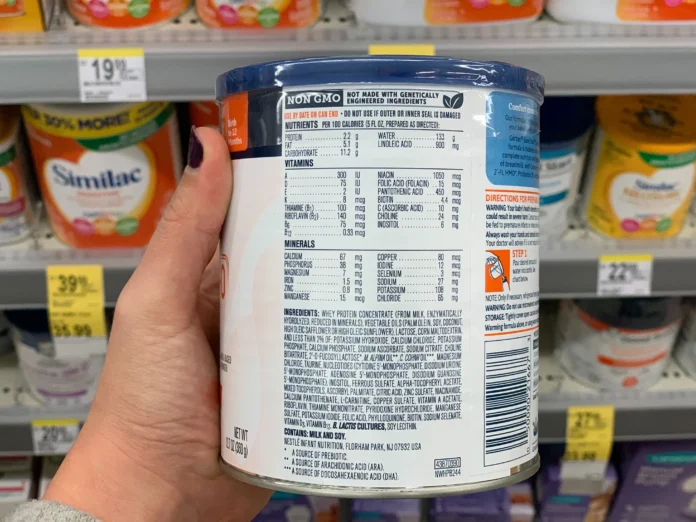Navigating the exciting yet challenging terrain of parenthood, especially as a new parent, involves myriad decisions that influence your baby’s growth and well-being. Among these choices, determining the right infant formula emerges as a crucial concern. It’s not merely about nourishment; it’s about ensuring your child gets the best start in life. The current market offers an impressive array of formula options, each boasting unique benefits. But how do you discern which is best for your little one?
Types of Infant Formulas

In today’s expansive market, infant formulas have been tailored to cater to diverse needs, ensuring every baby gets the nutrition they require. Here’s a breakdown:
- Cow’s Milk-Based Formulas: Predominantly available, these are designed to mimic breast milk. They’re altered to make the protein easily digestible for infants while ensuring essential nutrients are retained.
- Soy-Based Formulas: A boon for families whose babies might have lactose intolerance or for those who have chosen a vegan lifestyle from the start. These formulas derive their nutrients from soy proteins and are lactose-free.
- Hypoallergenic Formulas: Parents breathe a sigh of relief with these, especially if their baby has shown allergic reactions to regular formulas. They are processed to eliminate allergens, ensuring the baby’s safety.
- Special Medical Formulas: In some cases, infants with conditions like metabolic disorders, digestive complications, or certain illnesses need specialized nutrition. These formulas are designed keeping those needs in mind.
Nutritional Requirements for Babies
A baby’s initial year is a whirlwind of growth, not just physically but also cognitively. Essential nutrients act as building blocks during this phase. Proteins, fats, vitamins, minerals, and carbohydrates play distinct roles, each contributing to different facets of development. Often, breast milk is revered as the ‘gold standard’ of infant nutrition. This is due to its dynamic nature, adjusting to the baby’s needs over time. For some of the best baby formulas on the market please click here.
Signs That Breastfeeding May Not Be an Option

While the myriad benefits of breastfeeding are well-known, it’s essential to recognize that for various reasons, it might not be feasible for every mother. Some mothers may experience a low milk supply despite repeated attempts and interventions. Others might be on certain medications that could affect the breast milk’s quality.
In some situations, a mother might have undergone surgery, or the baby could have a latch problem. Moreover, personal choices and lifestyle can also influence the decision. In these scenarios, formulas rise as a savior. They offer a balanced nutritional profile, ensuring that the baby’s growth and development remain uninterrupted.
Consulting with a Pediatrician
One of the fundamental steps in your baby’s nutritional journey is seeking guidance from a pediatrician. The world of infant nutrition can be labyrinthine, and having an expert by your side can make a world of difference. A pediatrician can evaluate your baby’s health, growth patterns, and any special requirements they might have. This collaborative approach ensures that the chosen formula is in harmony with your baby’s needs. When selecting a pediatrician, it’s advisable to seek recommendations, verify their credentials, and ensure that they are approachable.
Reading Labels and Ingredients

In our age of information, understanding what goes into your baby’s formula is both a right and a responsibility. Labels and ingredients might seem daunting at first, with their scientific jargon and percentages. However, with a bit of diligence, you can become adept at discerning what’s beneficial for your baby and what’s not. Key ingredients to look for include essential fatty acids, proteins, carbohydrates, and specific vitamins and minerals. At the same time, it’s wise to be wary of excessive sugars, certain preservatives, and artificial colors.
Understanding Baby’s Special Needs
Every baby is unique, bringing their own set of requirements to the table. Some might have lactose intolerance, requiring a soy-based or lactose-free formula. Others might exhibit signs of allergies, making hypoallergenic formulas the preferred choice. Conditions like reflux or certain metabolic disorders might necessitate specialized formulas. Recognizing and understanding these specific needs is paramount. It ensures that the chosen formula not only provides general nutrition but also addresses and supports any special requirements, setting the stage for optimal growth and development.
Transitioning from Breast Milk to Formula
The shift from breast milk to formula can be both a necessity and a choice. Regardless of the reason, the transition should be smooth to ensure the baby’s comfort. Introducing formula gradually, possibly by mixing it with breast milk initially, can ease the baby into this new source of nutrition. Monitoring the baby’s reactions, both digestive and behavioral, can provide insights and indicate if any adjustments are needed. It’s also vital to maintain a balanced diet and ensure the baby receives other essential nutrients during this phase, making the transition holistic and beneficial.
Importance of Age-Appropriate Formulas

As babies grow, their nutritional needs evolve. What suffices for a two-month-old might not be adequate for an eight-month-old. This is where age-appropriate formulas come into play. Infant formulas cater to the youngest, focusing on foundational nutrients. Follow-on formulas are tailored for older babies, introducing more complex nutrients.
And toddler formulas are designed for those on the cusp of childhood, bridging the gap between baby formulas and whole milk. Recognizing and adapting to these stages ensures your baby receives the right nutrients at the right time, supporting consistent and healthy growth.
Common Formula-Related Concerns
Venturing into formula feeding often comes with its set of concerns. Parents might notice issues like gas, constipation, or frequent spitting up. While these can be common, it’s essential to monitor the frequency and severity. Simple solutions like ensuring the baby is burped properly, checking the formula’s consistency, or consulting with a pediatrician can alleviate these concerns. Remember, while formula feeding can have its challenges, with the right approach and resources, they can be effectively managed.
Conclusion
The journey of choosing the right formula for your baby, while intricate, is deeply rewarding. Armed with knowledge, insights, and a bit of guidance, parents can ensure their little ones receive the best nutrition tailored to their needs. Remember, every baby is unique, and what works for one might not work for another.
It’s all about observation, consultation, and making informed decisions. As you navigate this path, trust your instincts, lean on your pediatrician for support, and know that every choice you make stems from love and the desire to provide the best for your child.








